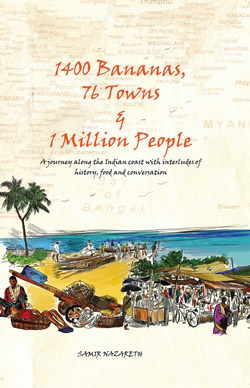 Lessons from a traveller
Lessons from a traveller
Published by: Leadstart Publishing Pvt Ltd
ISBN: 9789381115800
Pages: 379
Price: INR 399
Samir Nazareth is on an exploratory journey. He has quit his job and is spending months on the road; his aim—to explore as much of the coastal regions as he can, on a limited budget. The title of the book makes his primary interests evident—food, towns and people.
Food, clearly, is of great importance. Samir calls himself a ‘travelling gourmand’ delighting in local food, whether at the small thelas [carts] on the road, or in small hotels and shacks. This not just provides him with much needed nourishment at reasonable rates, but also acts as an ice-breaker for conversations. The towns he halts at are varied and interesting. He starts his journey by train from Nagpur to Bhuj; moves on to Okha at the westernmost point of India; travels down south to Rameshwaram and Kanyakumari, up the coast to Kolkata and Gangasagar; and finally heads towards the hills to Gangtok. Along the way, he stops at small and big towns, some he knows; some he has just heard of; some just end up on his itinerary according to the whims and fancies of the public transportation system.
Coming to people—they are everywhere! Unlike the towns and the bananas, there is no way he can keep a count here, but some stand out, and feature predominantly in the narrative. Whether it is the couple on the train, who is focussed on ordering food, the fishermen at Korlai, the guides at the palace museum at Trichur, or the hotel owner proudly talking of heritage at Puri—they enhance the story of his journey, reminding us of similar people we have met.
The narrative is smooth; Samir’s quaint humour coming through every page. There are hilarious bits, many relating to communication gaps due to difference in languages and dialects. His journey often takes him to ports and boat yards. We learn that he has some experience with them and naturally his knowledge in the area comes across. However, though the book is about his journey, we learn but little about him.
One thread that runs consistently through the book is the questions he is asked regarding his reasons for travel: Why does he travel? Why is he travelling alone? Why isn’t he married? But I like that he does not try to explain his actions and choices. After all, they are his reasons and his choices, relevant to him alone. Upon returning home, when he’s asked these same questions, he realises that he has come full circle.
I enjoyed reading the book, especially the sections about places that I have myself already visited. The people in this book reminded me of people I met on my trips and, as I read, I frequently had a nostalgic smile on my face.
Towards the end, Samir concludes that there is no such thing as a bad decision while travelling. I agree with him. Travelling is about the experiences; everything else is just incidental.
This was first published in the September 2015 issue of Complete Wellbeing.

